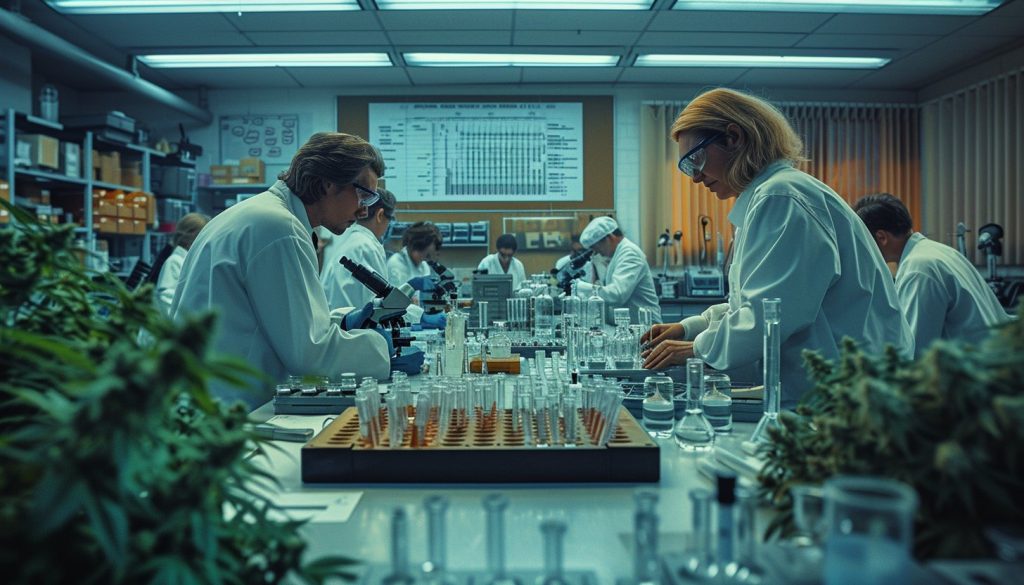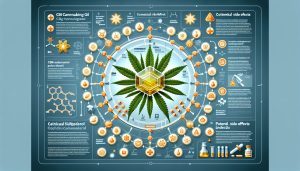In recent years, the CBD, or cannabidiol, has gained popularity as a substance with numerous health benefits. Although it is not psychoactive like its cousin, tetrahydrocannabinol (THC), it also comes from the cannabis plant. Therefore, a question often arises: how do the police manage to differentiate CBD from THC?
In this article, we will explore the different methods law enforcement uses to determine whether a sample contains CBD or THC. This includes the classic tests, as well as some more recent techniques developed specifically for screening for these substances.
Sommaire
ToggleTraditional drug tests
When it comes to detecting the presence of narcotics, police generally have several tools at their disposal, including:
- Saliva tests: This method involves collecting a saliva sample on a swab and analyzing the sample using a hand-held device. Saliva tests are capable of detecting the presence of various drugs, including THC. Unfortunately, they cannot distinguish between THC and CBD.
- Urine tests: Urine tests are also commonly used to screen for drug use. However, they can only detect THC metabolites, which are the molecules that remain after THC has been broken down and metabolized by the body. Once again, this method cannot differentiate between THC and CBD.
- Blood tests: Although less common due to their invasive nature, blood tests have the ability to detect THC and CBD levels in the blood. However, these tests often take longer to perform and require the intervention of a healthcare professional.
So, although some traditional drug tests can identify the presence of cannabinoids, they generally cannot distinguish between THC and CBD.
The importance of distinguishing CBD from THC
The need to distinguish CBD from THC is essential for various reasons:
- Psychoactive effects: THC is responsible for the psychoactive effects associated with cannabis, while CBD does not cause them. The police must be able to differentiate between the two to establish whether a person is under the influence of an illicit substance or not.
- Legality: In many countries, including some European Union states, CBD is legal for sale and possession, while THC is not. The police must therefore be able to determine which compound is present in a sample to enforce current laws.
The specific methods police use to differentiate CBD from THC
Faced with the limitations of traditional tests, law enforcement agencies have developed or adopted various other techniques to determine whether a substance contains CBD or THC:
Liquid chromatography
In analytical laboratories, liquid chromatography (HPLC) is often used to separate and identify the different molecules present in a sample. This technique allows CBD to be distinguished from THC and other cannabinoids. However, it usually requires expensive equipment and experts to use it properly.
Rapid detection kits
More recently, rapid detection kits based on enzyme-linked immunosorbent reaction have been developed to identify the different types of cannabinoids. These kits are designed to detect the presence of specific substances by binding to antibodies when a certain threshold is reached. They can thus distinguish between CBD and THC.
Infrared and Raman spectroscopy
Finally, some foreign police forces use portable instruments that employ infrared or Raman spectroscopy to quickly estimate the presence of THC and CBD in a sample. These methods are based on the vibrational properties of molecules and allow rapid and non-destructive analysis.
In summary
Although the traditional drug tests are generally unable to differentiate CBD from THC, other, more advanced techniques have been developed to help law enforcement obtain accurate results.
Using approaches such as liquid chromatography, rapid detection kits and spectroscopy, it is now possible to more easily distinguish between these two compounds, playing a crucial role in the enforcement of drug control laws. cannabis and similar substances.



